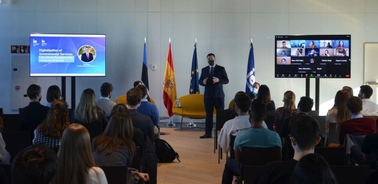- Home
- News And Events
- What’s Going On
- Digitalization Of Governmental Services: A Talk With The President Of The Parliament Of Estonia
Digitalization of Governmental Services: A Talk with the President of the Parliament of Estonia

The President of the Parliament of Estonia discusses the process and benefits of Estonia’s digital transformation.

The event was hosted by the IE Technology and Innovation Club and one of the special guests was Ángel Alonso Arroba, the Vice Dean of the IE School of Global and Public Affairs, who introduced President Ratas and participated at the event.
''The key to Estonia’s success in digitalization is transparency, openness, innovation and not saying “no” to something just because it has never been done before,” said Ratas.
The digitalization of governmental services consists of making government services available to citizens through the use of Internet and mobile technologies.
Ratas said the transformation benefits the country by allowing citizens to do any government process from home. From a social perspective, he said this frees up time for doing other activities they like, thus, promoting wellbeing.
“Digital services are designed to simplify the life of the user. This is what we call the citizen-centric approach. Estonia has always focused on the end user’s experience, meeting citizen demands, and finding ways in which the government can make their lives easier.”
Jüri Ratas, president of the parliament of Estonia

The talk was followed by a Q&A section which clarified many of the attendees’ doubts relating to this innovative system that is not yet a reality in most countries. One of the questions made by the public was, “Does this digital transformation negatively impact employment in your country as many job positions might be replaced by technology?”
Ratas responded, “On the contrary, this transformation has created many new jobs in other areas such as artificial intelligence, information technology systems, cyber security, etcetera, as more of these jobs are needed to be able to run a smooth digital transformation in a country.”
Ana Maria Martinez, a Politics, Law, and Economics (PLE) student, who attended the talk said, “These events are a great opportunity to understand the importance of setting the citizen wellbeing as the center of policymaking. It is possible to decrease the ineffective bureaucratic processes if the government and the people are willing to change their behavior towards a better future.”
Martinez said she appreciated the access to high-profile professionals that have fresh perspectives and openness.
“I really value how IE encourages students to learn beyond the theory proposed by scholars, and listen to the testimony of individuals who truly encourage our generation to seek better solutions for our society.”
Ana Maria Martinez, Politics, Law, and Economics (PLE) student
“Not only that, but I’m always grateful to have the opportunity to meet other students with similar interests to mine, who in the future will also have the necessary means to drive an innovative change.”
The event finished with a small cocktail, allowing attendees to network with Ratas and Ratnik.